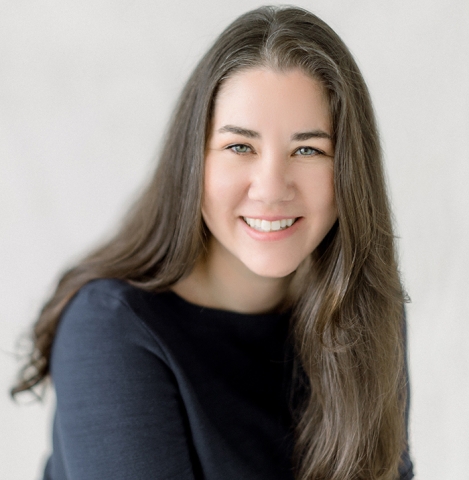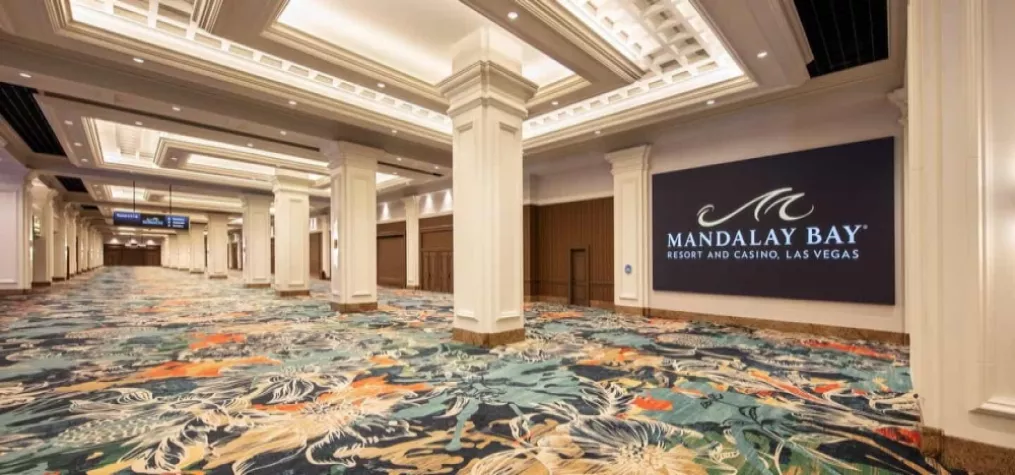Voices of the Future: Elizabeth George, Senior Event Lead, HIMSS Global Conference & Exhibition, Informa

As a trade show and events industry newcomer and fresh employee of Hanley Wood, Elizabeth George remembers having to look up what “drayage” meant on the internet after sitting in an afternoon meeting with members of the former organizer’s operations team.
“Safe to say, over the past years I’ve learned and experienced a lot of what our events industry has to offer, and while it’s hard work, I love it,” George says.
Throughout the past nine years of her career, George has had a chance to experience many different sides of the industry, working on teams managing digital sponsorships, sitting on a central marketing team helping to find solutions and services to help show management teams accomplish their goals, and now serving as a senior event lead on the global content and programming team at Informa, which recently acquired the HIMSS Global Conference & Exhibition from the Healthcare Information and Management Systems Society (HIMSS).
In addition to her job responsibilities, George says she has built an invaluable network of talented colleagues thanks to her time serving on the board of her local IAEE chapter, participating in Society of Independent Show Organizers (SISO) and Women in Exhibitions Network(WIEN) activities, and serving as an UFI, the Global Association of the Exhibition Industry next-gen leader in 2023.
“I am thankful for this community of individuals who will listen to my wild ideas, help brainstorm the finer points of a new project and just understand when I need to complain about that little thing that all drives us crazy pre-event,” George says.
TSNN had a chance to catch up with this passionate industry trailblazer to get her thoughts about the trade show industry’s strengths and weaknesses as well as how next-generation industry professionals can help shape a successful future for exhibitions and the audiences they serve.
What do you think are the trade show industry’s biggest strengths?
Our audience and the communities we curate. I often joke that there’s a “show for everything” from concrete to amusement parts, but that’s what makes our job special.
There is a sense of inspiration and excitement that I feel after attending a professional development conference, music concert or fan festival, or meeting people who are passionate about the same thing. I love that we are able to facilitate this for the audiences we are a part of.
The opportunities we get to facilitate this passionate audience are numerous, from corporate events, trade shows, webinars, networking groups, online chats and events, exclusive receptions, one-of-a-kind experiences and unexpected moments. There is truly no limit to the ways we can help our communities accomplish business, learn and develop new skills and make connections.
What are its biggest weaknesses?
Things change fast! We’re having conversations now that we weren’t having nine months ago around artificial intelligence and ChatGPT and the implications of their use. I think it’s difficult to even predict what may be the next buzzword in the next 12-18 months let alone act on it, especially if you plan an annual event.
What are your top concerns when it comes to the future of the events industry and why?
This year I’m one of UFI’s Next Generation Leadership (NGL) Grant 2023 recipients and we’ve been tasked with creating the new blueprint for events. With my fellow recipients we’ve been diving into what could be done better and how we should move forward as event organizers. Here are some things I personally believe:
- The events industry needs to move forward in an intentional way. The communities we plan events for are not static; goals change over time. To plan the same event year after year will not work. We must move forward intentionally, rather than reactively, to curate experiences that will bring in new visitors, exhibitors and talents to the events we plan.
- We need to meet communities where they are. Over the past few years I’ve seen an increase in the ways I can participate in the communities I belong to. Within seconds I can reach people on social media, Discord, WhatsApp groups, Teams and more. There is a great opportunity to create unique digital and live extensions of our event brands that serve the needs of that community. As consumers, we expect a variety of ways to interact with the brands we love, celebrities we follow and now the events we personally and professionally attend.
- We can’t continue to plan events in silos. Just as our events cannot rely on a single viewpoint, neither does shaping what the future of events look like. We must have a collaborative, cross-functional events team that considers all aspects of event designs, including our vendor and supplier partners.
- We must leverage technology to help streamline processes but we can’t let it replace our human expertise. Tools can help us batch content edits, create images or help outline a strategic marketing or sales plan, but it cannot replace personal insights.
Organizers must start to take risks. New technologies, event platforms, data and analytics, even the rise of industry influencers must be considered in future exhibition and event design. Our audiences deserve it. If we don’t adopt these technologies, we miss the opportunity to let our stakeholders take ownership.
How can next-gen event industry professionals get involved in ensuring a positive future for the industry?
Prioritize your personal and professional development. Pursue a certification by taking courses, volunteer to sit on a board for a professional organization or create a newsletter. It is important to stay up-to-date with trends and experience what is new. While your event may not be able to leverage the latest event technology or have the budget of a pop star’s international tour, there are pieces of inspiration that can carry through to the planning of your own event, conference or corporate event.
As we learn and grow it is also important that we get involved in creating a positive future for our industry. This can be done in a variety of ways from advocating elected officials, enabling students to experience behind-the-scenes of industry events or simply by encouraging new and young professionals to get involved.
I have been grateful for those in my career who have found opportunities for me to speak on a conference stage, advocated for me to attend industry events and supported me in serving on professional board of directors. I know that it’s now my responsibility to do that for others.
Where do you envision your career going and what are your biggest hopes for the industry overall?
My dream role would be to build the strategy and implement experiential moments within our events to help connect exhibitors and attendees. As our communities grow and expectations change, people will be seeking out these unique experiences that intentionally consider the goals of attendees and exhibitors at events. Ultimately we are humans first, even while doing business, and we deserve to be inspired.
My biggest hope for the industry’s future is that we center ourselves on why we do what we do and why it matters. It doesn’t matter if we leverage the most cutting-edge technologies, hire the best motivational speaker or design the most brilliant show floor or conference programming if we fail to give our audience what it needs. The experience must always be centered around what our audiences have entrusted us to do: to build touchpoints for communities to do business, make connections and propel industries forward.
Know of a dynamic young event professional you'd like to nominate for Voices of the Future? Please reach out to lpsavas@tsnn.com and dtormohlen@tsnn.com.
Don’t miss any event-related news: Sign up for our weekly e-newsletter HERE, listen to our latest podcast HERE and engage with us on Twitter, Facebook and LinkedIn!


Add new comment